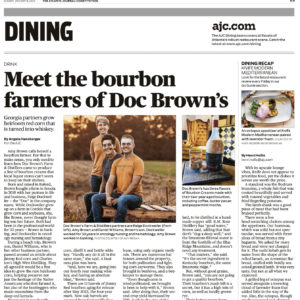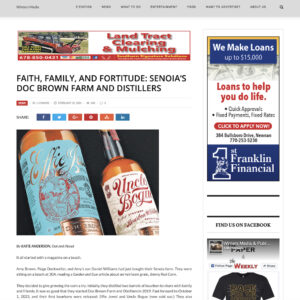
Well, we are sending out a big thank-you to everyone at Good Grit, the online southern culture magazine. We recently talked to their journalist, Jennifer Kornegay, who captured our story perfectly in the piece that we share with you today, originally published right here under the header Women’s Work.
Jennifer’s fine words are matched by Ari Skin’s photography. We love it, and we love the Good Grit mission to paint “…a progressive and truthful representation of who we are and who we want to be…” here in the South. Amen to that.
—
The Spirit Behind Doc Brown
Words by Jennifer Kornegay
Photos by Ari Skin
When you hear Amy Brown, cofounder of Doc Brown Farm and Distillers talk about her farm, her commitment to its care is palpable. “My business partner Paige Dockweiler and I both come from farming backgrounds, and we fled it as young adults, turning to different careers,” she says.
“But a love of the land stayed in us and eventually pulled us back. Protecting our land and working with it to grow and create things—I don’t know anything that’s better.”
So, it’s no surprise that Georgia’s only seed-to-still, grain-to-glass distillery was inspired by an obscure, almost-extinct heirloom crop. After Brown’s son showed her a magazine article outlining the discovery and revival of Jimmy Red Corn, an idea took root. Amy and Paige had recently bought some farmland and were considering raising cows and goats, but the concept of helping preserve a relic of the South’s agricultural history was too intriguing to pass up. “Paige, my son Daniel, and I decided to grow Jimmy Red, but then there was the question, ‘What do we do with it?’” she says. “It’s not the kind of corn you cook up and slather with salt and butter to eat.”

The corn’s own origin story provided the answer. Before it almost disappeared, it was the variety most favored by Southern moonshiners, so the original thought was to grow a little corn and make a little bourbon to give to friends and family. “We thought that would make fun wedding gifts,” Brown says.
Armed with this plan, Doc Brown planted its first fields of Jimmy Red in 2019. They looked into building a distillery onsite but decided to contract distill instead, allowing them to move faster but still have total control of their product. After harvest, they sent the mash recipe they developed and their grains to a distilling facility in Atlanta and ended up with four barrels of bourbon. “We were so proud of ourselves! We thought we had won the lottery,” Amy says.
But then, as good ideas are wont to do, not unlike their cornstalks, that initial notion—producing just a bit of corn and bourbon—flourished and grew. High praise was the primary fertilizer. “The distiller told us it was such great corn, with the right amount of protein and sugar and high oil, which gives bourbon its smoothness,” Amy says. “That got us thinking, OK, should we really do this?” Amy had some concerns about working closely with family and owning a business with her friend, knowing the problems it can raise in relationships. “We talked it through and promised to keep personal and business separate, and so far, we have,” she says.

So, Paige, Amy, and Amy’s son Daniel Williams joined forces to found a company, dubbing their venture Doc Brown, combining part of Paige’s last name and her profession (she’s an oncology hematology specialist) and Amy’s last name. Today, Amy is full-time farm manager, and Doc Brown is not just Georgia’s only grain-to-glass distillery, it’s also the state’s only one led by women, and one of only four women-led, grain-to-glass distilleries making bourbon in the country. “We grow our own grains,” Amy says. “We distill it in Georgia and put it in Georgia-made barrels.”
But the farm is Doc Brown’s foundation. The team plants about 40 to 50 acres of both corn and an heirloom Italian rye that’s a part of the Doc Brown recipe each year. Cultivating old-school crops means using old-school methods. The farm avoids harsh pesticides, relying on the bats attracted by the farm’s many bat houses to feast on the insects that can damage corn. It uses bees to augment pollination and deliver bigger yields. And the soil is constantly replenished with cover crops.
The same attention to detail occurs at the distillery; despite it being offsite, the Doc Brown team is hands-on with each aspect of the process. “It’s not our building or equipment, but it’s our crops, our methods, our mash bill,” Brown says. “We are right there alongside the master distiller, tasting and then putting it in barrels and moving them to the rickhouse to age.”
Its signature sip, Effie Jewel bourbon, is dedicated to all women who enjoy their whiskey and is named after Amy’s great aunt. Day Swigger, a butter-pecan flavored bourbon liqueur, launched last May. And Doc Brown’s bourbon cremes, released last year, won a coveted Garden & Gun Made in the South Award.

Pleasing customers with Doc Brown’s spirits thrills Amy, but she believes there’s more to it than savoring the liquid itself. “Bourbon is an experience; I want people to open our bottle and understand that we do it all,” she says. From the dirt to tipping back that drink, the folks behind Doc Brown put intention and thought into every step.
But the hearts of Doc Brown’s founders are dug in deep at their farm. Amy stresses their connection to their patch of earth, and dedication to its future underpins the company’s success. “All of us at Doc Brown love bourbon and whiskey and that world, but it’s the farming that first drew us into this,” Amy says. “That’s where our true passion is.”
Amy believes being a female-founded and led company also lends a special note to Doc Brown’s flavor. “It is still a male-dominated industry, but we’ve never felt shunned. Instead, we’ve gotten so much advice and help; I think most people are excited by more women getting into this,” she says.
When the days are long and the work is hard, Amy’s old-fashioned glass remains half full, thanks to the rewards she’s reaping from the farm. “Seeing people from all over the country enjoying a taste of our farm means a lot,” she says. But doing it with family means even more. “We’re having so much fun together,” she says. Her six grandkids and their six little sets of eyes watch her and her son put in the work in pursuit of a goal while nurturing and nourishing their land. “I love showing them that example and creating a legacy for them and for following generations,” Amy says. “I mean, how great is that?”


